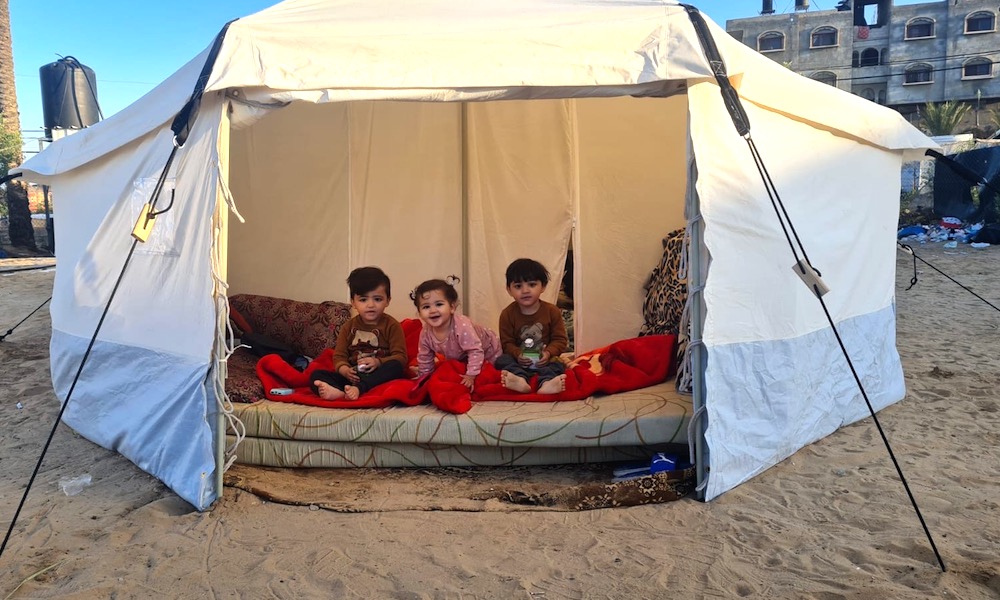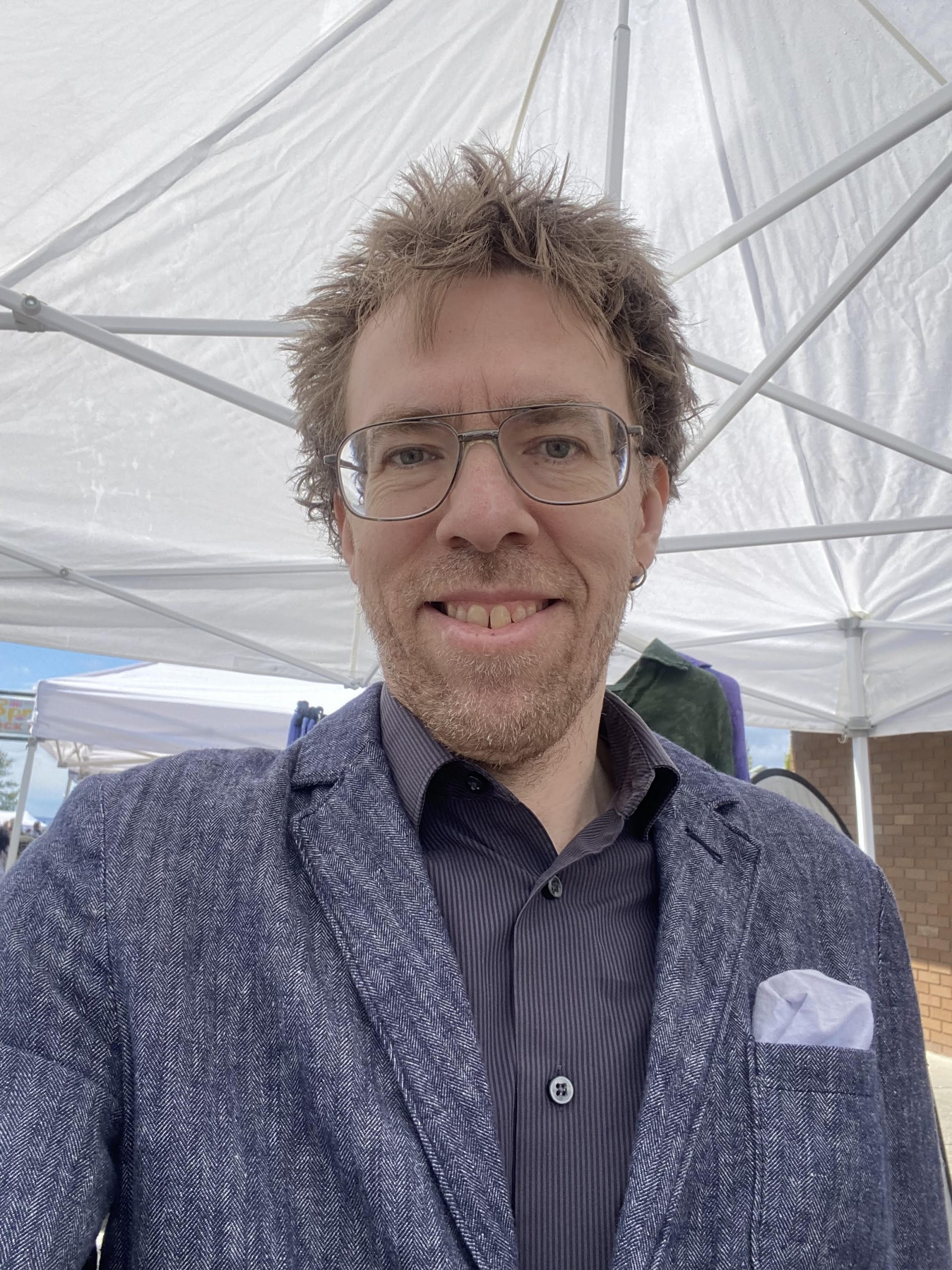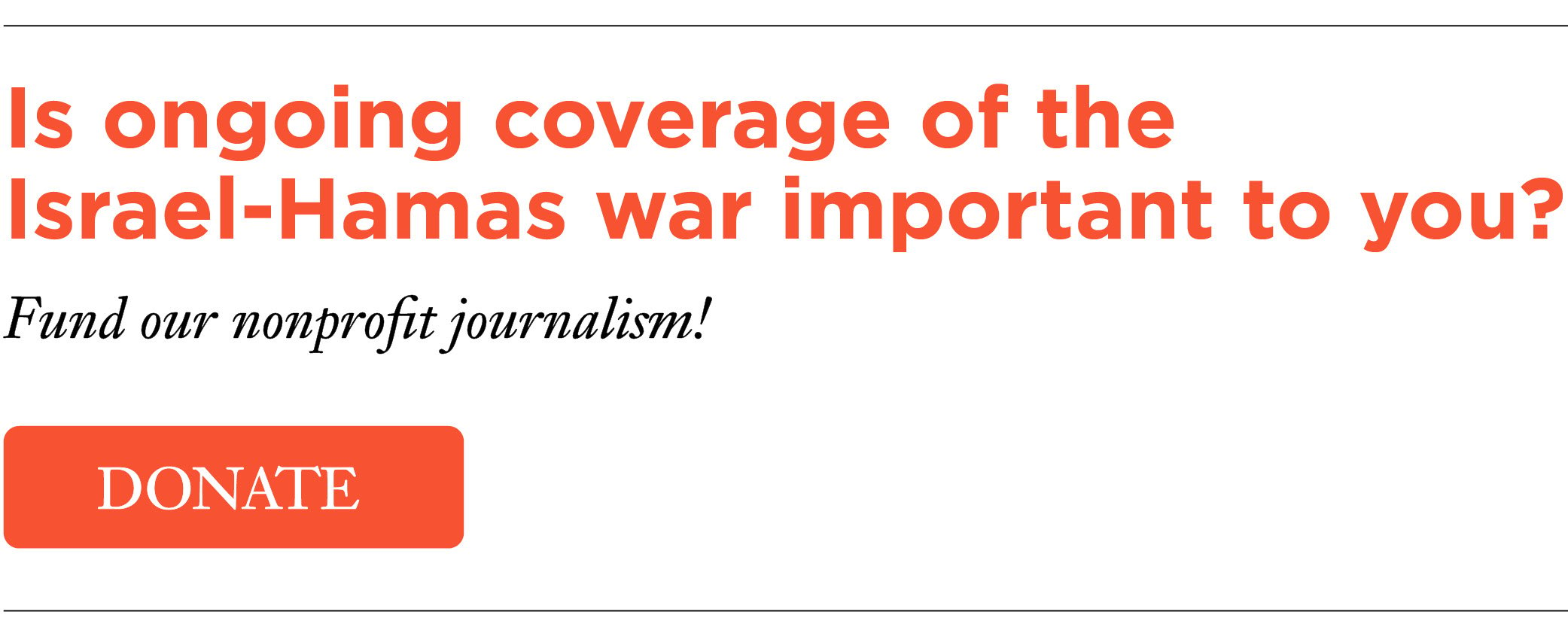A Zoom Room With A View: One Man’s Window Into A Rafah Refugee Camp
Since February, Eros Salvatore has been a lifeline for Gazans seeking to escape Israeli bombardment of Rafah’s refugee camps.

“We were trying to leave the building when it was set on fire. And it was like a lot of destruction like you can see.”
It’s early May. Omar Skaik, a Palestinian man currently in Rafah, is narrating his story via Zoom as his friend in America, Cassandra Martin, screenshares pictures of smoke and the gray rubble of Skaik’s apartment building in Gaza City. “A lot of people are fallen on the ground. Some of them are asking for help. And other people are dead,” he continues. An image appears of a body, the head a bloody mess. “Yeah, this is my neighbor. It’s really hard to see him always, to see how he got killed that way. It really hurts me,” Skaik’s voice wavers. “I was spending the night with him. He was my close friend.”
“Hold on, Omar,” another voice interrupts. “Cassandra, I advertise this as a place where there’s not gory pictures. I don’t mind things that are destroyed but not of human beings. That’s just a little bit too much. Otherwise please go ahead.”
That’s Sean Simms, who prefers to go by his longtime nom de plume, Eros Salvatore. He has convened this virtual meeting, held on a Sunday with a dozen other people: Some are internally displaced Gazans seeking help. Most of the rest are in America. One woman is calling in from Dubai.
Salvatore has led an unconventional life–he has worked as a social worker, produced two short, dreamlike films, and today he supplements his income from dyeing and selling clothes with Social Security Disability benefits. Nor is this his first foray into helping strangers he’s met online–he has a close bond with a young Pashtun woman from Swat, the same city as Malala who thinks of him as her foster father. Writing, he says, is his main creative outlet. He describes his work as creative nonfiction, and doesn’t hesitate to put himself and his perspective into the stories he writes, citing Hunter S. Thompson as an important influence.
Before October 7, Salvatore didn’t have any ties to Gaza. Yet once Israel’s ground invasion of Gaza began, the 52-year-old, who lives in Washington State, felt a strong urge to help in some way. In February, as the fighting intensified, he decided to seek out Gazans on Facebook and offer to write articles about them in hopes of raising awareness about their plight. Now, he serves as a daily point of contact for people desperate to reach the outside world. Salvatore says he is motivated by a sense of kinship and solidarity. “I don’t have any close family left alive, and so I often feel very alone and isolated, in a lot of ways,” he says. “So I have a feeling like a refugee, even though I haven’t gone through an actual war, I feel an affinity with people who’ve lost everything.”
Soon after Salvatore began his outreach in February, he connected with Anwar Ghilan, a former English teacher who was sheltering in a small tent in Rafah with eleven members of his family. Salvatore wrote a piece about Ghilan for Z Network, a left-wing activist web publication, that included a link to his GoFundMe page. A few weeks later, Ghilan was successfully able to flee to Egypt with his family.

Eros Salvatore
Salvatore wrote his next post about his communications with six women trapped inside Gaza. One woman, 25-year-old English teacher Maryam Hasanat, told him that her friend had just died from a C-section gone wrong with no medical supplies. Hasanat herself was eight months pregnant and was told she needed a C-section as well. She told him that unless she could raise $25,000 for herself, her husband and their son Karem—and hopefully an additional $25,000 for her mother and sister—to flee to Egypt, she feared dying in childbirth. (For the most part, Salvatore is unable to independently verify these stories–he mostly goes by instinct when deciding who to help, though in some cases he’s requested medical records. Moment has also not independently verified these accounts.)
Hearing these stories is difficult, but Salvatore is stoic. “I made a decision to face all the experiences I came across when communicating with refugees. I let myself feel the horrifying emotions that come up until they go away,” says Salvatore. “I get flashes of fear, and I accept whatever it is I hear.”


A few days before his piece featuring Hasanat went up, Salvatore was able to help set up a GoFundMe and the fundraiser went viral—Hasanat was able to raise $40,000 within a week and register to go into Egypt. Unfortunately, Hasanat went into labor on the day she was supposed to leave Gaza with her family, and Israel closed the border the next day. She is now living in one of the new refugee camps near Rafah. She did survive childbirth, however—she was able to give birth without a C-section because her daughter, Talia, was born prematurely at 4.4 pounds. “Alhamdullah, with your support our very difficult conditions improved during the war, and we have been able to withstand until now,” she and her husband wrote on their GoFundMe page on May 22. “Now we are waiting for the crossing to open so that we can travel. We were able to buy expensive food, the costs of treatment for the children, and to give birth safely. We were able to move from a nylon tent to a tent better than treated fabric and help relatives as well. Every step we took, we felt that we had an army of wonderful friends like you behind us.”
Another woman in the story, Mays Astal, also had a risky pregnancy and, along with Ghilan, is one of the only refugees Salvatore has connected with who has successfully made it into Egypt. “She either gave birth in Cairo or is about to give birth any day,” he says.
But many are not so lucky. “Diana Hamada heads three families that total 27 people, mostly children, and young adults, even though she herself is only 29,” Salvatore says, of a woman he’s met on Zoom. “She supported herself as an English teacher only to lose everything and be thrown into hell.”
Salvatore virtually met Omar Skaik, mentioned above, through an Indonesian war photographer named Kawan Perasa, who was curating photos on Gaza on Facebook and Instagram [Warning: many of the images are very disturbing]. Until the war began, Skaik, who worked for an internet service provider, lived in Gaza City with his wife, a pharmacist, and their three infant children, Muhammed and Kareem (now two years old) and Maryam (now one). Skaik’s parents lived in the apartment next door. After the building was destroyed by Israeli bombing, the family made the harrowing journey south to an apartment in Rafah on donkey carts and tricycles despite his mother’s mobility impairments and his father’s diabetes and hernia. On the trip, Skaik says, one of his sons sustained a serious burn, and he’s had a challenging time finding sterile bandages and burn ointment. In addition, he says, the incision from his wife’s C-section, which never healed from a year ago, appears to be infected, and Hepatitis A was running rampant throughout the Rafah building before it was destroyed. “We barely have running water from our faucets, and we are having a hard time finding water,” Skaik shared hesitatingly, before acknowledging: “Actually, we have not had [running] water for four days.”
A few months after he started communicating with people in Gaza, Salvatore’s friends Hasan and Latifa Martin (who converted to Islam from Judaism) expressed an interest in connecting with some of his contacts there. Salvatore thought of Skaik, and hit upon the simple but powerful idea of hosting Zoom meetings between people in Gaza and in the United States. After the first meeting, they decided to start inviting other Americans who might help. At their peak in early May, about 16 people joined the meetings in total.
Zooming Into Rafah Refugee Camps
Skaik has now raised more than $19,000 and secured permission to pass into Egypt. Yet when the Israeli military entered Rafah on May 6, they closed the crossing and the Skaiks, like the Hasanats, were unable to leave—a video on their Instagram page shows Omar riding into a Red Crescent camp with the family’s belongings on a donkey cart, and photos show the family of five in a small shared tent. The house they had been staying in with two other families was destroyed. He has not been able to join any meetings since the IDF’s invasion into Rafah, because he has not had a strong enough internet connection for Zoom. Salvatore, who now keeps in touch with Skaik on others through his international phone plan rather than with apps that require data, says in the days after Israel’s incursion into Rafah on May 6 Skaik installed 70 tents for newcomers for the Red Crescent Society, and continues to volunteer in other capacities.
Salvatore says the backgrounds of the refugees he’s connected with are fairly similar, partially because he’s found people online, meaning they all have means to connect one way or another, and partially because some of the internally displaced people have introduced Salvatore to their relatives. “They are all, both the men and the women, college graduates in civil engineering or English or other related subjects,” he says. “Most of them are in their thirties with some of the women in their twenties. Most of their children are very young. Most of them also take care of elderly parents.”
Salvatore can’t help everyone. He tells the story of one woman, Samar Al-Sadi, who told him she lost thirty members of her family and is in her third trimester of pregnancy. “She doesn’t come to the meetings because their internet is very bad and she is too emotionally damaged to talk,” says Salvatore. ”I looked at her medical records in order to confirm her story and had a doctor translate them into English. She may die from birth complications due to anemia and is psychologically disturbed by losing most of her family besides her husband and kids.”
Despite Salvatore’s hopes, attendance at the meetings has declined, and at the end of May, they will move from weekly to monthly. Salvatore suspects this is due to his lack of social media prowess on the one hand, and psychological resistance on the other. “People like the idea of fighting for a cause or someone’s rights more than sitting down with those people and having a discussion with them,” he says.
Salvatore notes that even if the money he helps raise doesn’t end up helping these families leave Gaza, it will still help their financial situation and help them rebuild their lives. Most of all, it gives people hope. Yet he is prepared for more tragedy. “Things have gotten worse in Gaza since the invasion of Rafah,” he says. “None of that aid from the American-built pier has been distributed to refugees, and most of the refugees who fled Rafah had to leave behind tents, solar panels and cooking equipment—so add that to no food and no clean water and you have a severe catastrophe developing. There could be many thousands and even ten of thousands of deaths next month.”
Top image: This photo, from May 23, shows Omar Skaik’s three children in their tent at the Red Crescent humanitarian refugee camp outside of Rafah.
